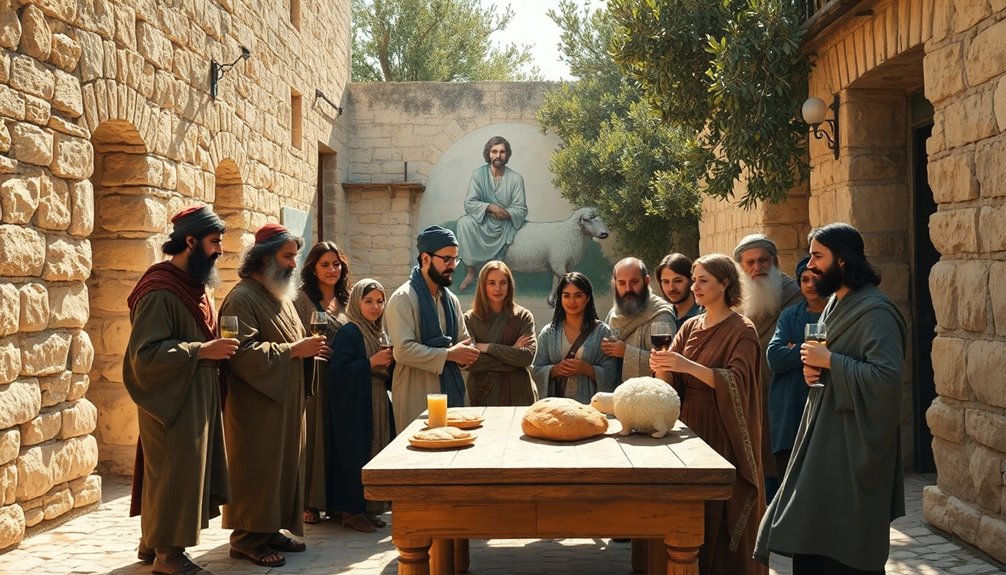Jesus saves you from sin and offers the transformative gift of grace. Through His sacrifice on the cross, you receive forgiveness and a chance for eternal life. By having faith in Him, you become a child of God, experiencing a profound change in your life. Scripture tells us that salvation is a free gift, not something you can earn. It's about recognizing your need for His mercy and grace. Jesus intercedes for you, bringing strength and protection in your journey of faith. There's much more to explore about how this salvation shapes your life and purpose.
Key Takeaways
- Jesus' sacrifice on the cross provides salvation from sin, fulfilling the requirement for redemption.
- Belief in Jesus transforms individuals into children of God, offering hope and purpose.
- His resurrection assures believers of eternal life and the sufficiency of His sacrifice.
- Salvation is a free gift from God, accessible to all who confess faith in Jesus.
- Jesus intercedes for believers, providing protection and strength in their faith journey.
Introduction

When you consider the profound impact of Jesus in our lives, it becomes clear that His role in salvation is central to the Christian faith. Jesus saves us from our sins, taking on the penalty we deserve through His sacrifice on the cross. This act of love showcases the depth of God's grace, offering a pathway to reconciliation with Him.
His resurrection three days later not only confirms the sufficiency of that sacrifice but also provides hope for eternal life to all who believe.
Faith in Jesus is essential for receiving this free gift of salvation. As you place your trust in Him, you become a child of God, welcomed into a loving relationship with your Creator. This transformation ensures you're not condemned, as Jesus intercedes for you, keeping your faith strong and protective.
Through His love, you're not just saved; you're invited into a new identity as a cherished member of God's family. Understanding these truths deepens your appreciation for the magnitude of Jesus' sacrifice and the eternal implications of your faith.
Embrace this gift, and let it change your life.
Essential Biblical Passages

To understand the core of Jesus' saving message, you'll want to explore essential biblical passages that highlight His role in salvation.
Key verses like John 3:16 and Romans 10:9 lay the foundation for your faith, while other scriptures provide deeper insights.
Let's look at both primary and secondary references that illustrate the significance of Jesus in your spiritual journey.
Primary Bible References
Acts 4:12 reinforces the truth that there's no other name under heaven by which we must be saved, affirming the exclusivity of Jesus.
Romans 10:9 outlines the necessity of faith: "If you confess with your mouth that Jesus is Lord and believe in your heart that God raised Him from the dead, you'll be saved."
This reveals how grace is a free gift, as Ephesians 2:8-9 states: "For by grace you have been saved through faith… it's the gift of God."
In these passages, we see the pathway to salvation through faith and confession, urging you to believe in Him for eternal life.
Secondary Bible References
Building on the foundational truths about salvation, secondary Bible references further illuminate the significance of Jesus in our redemption. In Matthew 1:21, we're reminded that Jesus saves us from our sins, highlighting His role in redeeming humanity.
Romans 3:23 emphasizes that all have sinned and fall short of God's glory, reinforcing the universal need for salvation through the Lord Jesus Christ.
Ephesians 2:8-9 teaches us that this salvation is a gift from God, received through faith, not by our works. This underscores the immense grace inherent in Jesus' saving act.
John 3:16 beautifully proclaims that believing in Jesus grants us eternal life, showcasing the promise of salvation available to everyone who trusts in Him.
Finally, Romans 5:9 affirms that through Jesus' blood, we're justified and saved from God's wrath. This passage illustrates the profound impact of His sacrifice on our salvation.
Together, these scriptures reveal the depth of God's love and highlight the essential truth: through Jesus, we find redemption from our sins and the promise of eternal life.
First-Century Jewish Practices

First-century Jewish practices were deeply rooted in spirituality and community life, reflecting a profound commitment to worship and tradition. You'd find daily prayers and blessings integral to maintaining a close relationship with God, as these rituals helped foster gratitude and connection.
The observance of the Sabbath (Shabbat) was crucial, starting Friday evening and lasting until Saturday evening, during which work was set aside to focus on rest and spiritual activities.
Ritual purity also played a significant role, with practices like handwashing before meals and avoiding certain sources of impurity, as instructed in the Torah.
The Jewish calendar was marked by important festivals, including Passover (Pesach), which celebrated the Exodus from Egypt, and Yom Kippur, the Day of Atonement, emphasizing repentance and forgiveness.
Synagogue worship served as a vital communal hub, where you'd gather for prayer, the reading of the Torah, and teachings led by a rabbi or respected community member.
These elements created a rich tapestry of spiritual and communal life, allowing individuals to engage meaningfully with their faith and each other. Additionally, the practice of visualization techniques in contemporary spiritual contexts draws parallels with the intentions behind first-century rituals, highlighting the enduring power of focused intention in fostering a deeper connection with the divine.
Cultural Context of Salvation

Understanding the cultural context of salvation during Jesus' time reveals how deeply intertwined it was with Jewish law and traditions. Sacrifice and atonement were central to this framework, as they represented the means through which sins were purified. Jesus' role as the sacrificial lamb transformed these concepts, illustrating a new path to redemption rooted in faith and grace.
In the backdrop of Roman society, where individual virtue was celebrated, Jesus' message offered a radical departure. Early Christians, often facing persecution and societal rejection, clung to salvation not just as a theological concept but as a source of hope and resilience. Amid cultural hostility, the promise of eternal life became a beacon for those yearning for purpose.
As Christianity spread, it adapted to various cultures, emphasizing inclusivity. This inclusivity highlighted that salvation transcends ethnic and social boundaries, addressing the universal need for redemption.
Greco-Roman philosophies, which typically viewed the material world as flawed, found resonance in Jesus' promise of spiritual renewal, making his teachings even more compelling. Ultimately, the cultural context shaped a transformative understanding of salvation that still echoes today.
Misunderstandings About Salvation's Nature

You might think salvation can be earned through good deeds or that it's just a one-time decision, but that's a common misunderstanding.
It's crucial to grasp that grace is sufficient and available to everyone who believes in Jesus, not just a select few.
Let's clarify these misconceptions and explore the true nature of salvation together.
Debunk Common Salvation Misconceptions
Salvation is often surrounded by misconceptions that can lead to confusion and misunderstanding. Many people mistakenly think they can earn salvation through good works, but the Bible clearly states it's a free gift received by faith. Jesus' sacrifice saved us, and He's the propitiation for our sins, covering the sins of the whole world—not just a select few.
The truth is, salvation is available to everyone who believes in Him, as shown in John 3:16.
Some believe that repentance is optional, but genuine faith requires a change of heart and mind regarding sin. This commitment to follow Christ is essential.
Additionally, there's a common notion that once you're saved, you can never lose that salvation. However, Scripture emphasizes the importance of continuing in faith, warning against falling away from that grace.
Misinterpretation of Grace's Sufficiency
While many embrace the concept of grace, misconceptions about its sufficiency often cloud their understanding of salvation's nature. You might believe that your own efforts or good works play a role in your salvation, but Ephesians 2:8-9 clearly states that salvation is a gift from God, not something you can earn.
Some may think grace allows for a lifestyle of sin, misunderstanding Romans 6:1-2, which emphasizes that true grace leads to transformation, not indulgence. You might feel unworthy of grace, but 1 John 1:9 reassures you that confessing your sins brings forgiveness and cleansing from all unrighteousness.
It's crucial to recognize that grace isn't exclusive; Romans 1:16 reminds us that the gospel is for everyone, no matter their past. Furthermore, grace isn't a one-time event. Hebrews 4:16 invites you to continually approach God's throne to receive mercy and find grace in times of need.
Understanding grace's sufficiency frees you from the burden of unworthiness, enabling you to embrace the full, transformative power of salvation. Remember, grace is about God's unconditional love and mercy, available to all who believe.
Daily Acts of Compassion

You can make a real difference in your community through daily acts of compassion, starting with simple gestures like forgiveness in your relationships.
By engaging in community service initiatives, you embody Jesus' love for others and help those in need.
Let's explore how these actions reflect His teachings and can transform lives.
Forgiveness in Daily Relationships
Forgiveness acts as a powerful tool in daily relationships, reflecting the grace and mercy that Jesus taught. When you choose to forgive those who wrong you, you're not just letting go of resentment; you're fostering emotional healing within yourself and strengthening your connections with others.
Studies highlight that forgiveness can reduce stress and improve mental health, making it a vital aspect of compassionate living.
Practicing forgiveness aligns with Jesus' command to love one another. Remember, your ability to forgive mirrors the forgiveness you receive from God. By engaging in daily acts of compassion, such as letting go of small grievances, you cultivate a heart full of kindness and gratitude. This deepens your relationships, both with others and with God.
Moreover, your acts of forgiveness can create a ripple effect, inspiring those around you to embrace a culture of compassion and understanding. As you extend grace to others, you encourage them to do the same, weaving a tapestry of love and kindness in your community.
In this way, forgiveness isn't just an act; it's a transformative practice that enriches your life and the lives of those you touch.
Community Service Initiatives
Community service initiatives play a crucial role in fostering daily acts of compassion, as they encourage individuals to step outside their comfort zones and make a positive impact on those around them. By volunteering in local shelters, food banks, or community gardens, you can support those in need while also experiencing the joy of giving.
Many organizations promote "random acts of kindness," inspiring you to perform small, thoughtful gestures that can significantly affect others' lives. Participating in community clean-up days not only beautifies your neighborhood but fosters unity and care among residents. These acts of service create a bond that strengthens your community.
Initiatives like "pay it forward" campaigns further inspire you to contribute positively, creating a ripple effect of generosity and compassion. Additionally, educational programs on social issues often accompany these efforts, raising awareness and encouraging informed action towards helping marginalized groups. Engaging in community service can also provide a sense of stability, similar to the importance of establishing clear rules for children in co-parenting situations.
Engaging in community service isn't just about helping others; it's also about growing as a person. Through these daily acts of compassion, you can embody the spirit of generosity, making a lasting difference in both your life and the lives of those you touch.
Final Thoughts on Salvation

When considering the profound gift of salvation, it's important to recognize that it's not merely an abstract concept but a transformative reality that impacts every aspect of life. Salvation is a free gift from God, available to all who believe in Jesus and His sacrificial death for humanity's sins.
By acknowledging your sin and need for salvation, you open the door to receive God's grace, leading you to genuine repentance and faith in Jesus.
Jesus' resurrection three days after His death confirms the sufficiency of His sacrifice, offering you the assurance of eternal life. The Holy Spirit plays a crucial role in this journey, guiding and empowering you while assuring you of your identity in Christ.
Trusting in Jesus alone for your salvation means you can have confidence in your relationship with God, as He intercedes for you.
Ultimately, salvation is about more than just a moment; it's about a lifelong transformation through grace. Embracing this truth allows you to experience the full richness of life in God in Christ Jesus, filled with hope, joy, and purpose.
Additional Resources

There are a wealth of additional resources available to deepen your understanding of salvation through Jesus. The Bible itself is your primary source, emphasizing that Jesus is the sole way to salvation, as stated in John 14:6.
You'll find critical passages like Romans 10:9-10, which highlights the necessity of confessing Jesus as Lord and believing in His resurrection.
Theological commentaries and study guides provide valuable insights into Jesus' sacrificial death, described in 1 John 2:2 as the propitiation for humanity's sins. These resources clarify how salvation is a gift of grace through faith, as highlighted in Ephesians 2:8-9, reinforcing that it's not based on your works.
Additionally, educational materials and sermons focused on Jesus' life and teachings can enhance your understanding of His role as Savior. They illustrate His mission to save humanity and His ongoing intercession for you.
Frequently Asked Questions
Where in the Bible Does It Say That Jesus Saves Us?
In the Bible, several passages highlight the idea of salvation through Jesus.
You'll find that Matthew 1:21 emphasizes His role in saving people from their sins.
John 3:16 tells you that belief in Him grants eternal life.
Acts 4:12 states there's no other name for salvation.
Additionally, Romans 10:9-10 explains how confessing Him as Lord leads to salvation.
These verses collectively affirm the belief in Jesus as the source of salvation.
What Did Jesus Do to Save Us?
To understand what Jesus did to save you, consider His journey through suffering and sacrifice.
He willingly faced immense pain, praying for strength before His crucifixion. By dying on the cross, He took on the weight of humanity's sins, providing the ultimate payment for justice.
His resurrection three days later confirmed His victory over death, offering you the assurance of eternal life and the invitation to embrace faith and repentance for salvation.
What Is It Called When Jesus Saves You?
When you experience salvation, it's often referred to as being "saved."
This transformative act means you're justified by faith, leading to a renewed relationship with God. You're not just forgiven; you become a new creation, leaving your old self behind.
It's a profound change that brings peace and assurance, knowing you're secure in your faith. The journey doesn't rely on your works but rather on the grace offered to you.
How Does Jesus Say We Are Saved?
You'll find that Jesus teaches salvation comes through faith in Him.
It's about believing in His work and trusting His sacrifice. He emphasizes that confessing Him as Lord and recognizing His resurrection are essential steps.
By accepting this gift of grace, you're not relying on your own actions but on His love and mercy.
Jesus assures you that He's the only way to reach the Father, highlighting the importance of faith for eternal life.










